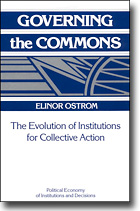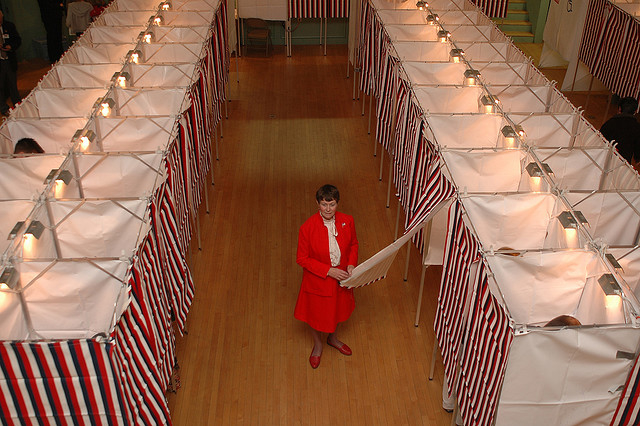What geeked-out little changes to our voting system would you make to result in huge benefits to representative government?
 On Becky‘s recommendation, I’ve been reading Elinor Ostrom’s Governing the Commons. The extraordinarily fun part of the book is how quickly it gets you out of the “government is either the solution or the problem” debate. Now, Ostrom tightly circumscribes her research, limiting it to common-pool resources (fisheries, grazing land, and the like), excluding common goods (which is what I focus on below, in terms of voting), and suggesting the self-governing, self-regulating structures she studies can’t be broadened to the largest organizational structures…like national governments.
On Becky‘s recommendation, I’ve been reading Elinor Ostrom’s Governing the Commons. The extraordinarily fun part of the book is how quickly it gets you out of the “government is either the solution or the problem” debate. Now, Ostrom tightly circumscribes her research, limiting it to common-pool resources (fisheries, grazing land, and the like), excluding common goods (which is what I focus on below, in terms of voting), and suggesting the self-governing, self-regulating structures she studies can’t be broadened to the largest organizational structures…like national governments.
But that doesn’t mean I’m not tempted to do it anyway.
Last night I was watching Paul Ryan’s speech as he accepted the GOP nomination for vice president. And it was striking how, having just read another chapter of Ostrom’s book, I saw how Ryan could never consider an alternative to the pro vs. con argument about government size and influence. In fact, every national government figure, except the very wonkiest, does the same thing.
So asking a question that parallels Ostrom’s work: what if we explored civic improvements that had nothing to do with bigger or smaller government? Like the Center does, what if we concentrated even more on how we make decisions (process) instead of what decisions we should make (policy)?
Here’s a thought-exercise to demonstrate the point:
What would be the effect of changing voting laws so that voters vote with points based on the percentage of income they pay in taxes? Higher tax rates, more points, more voting power. Points are determined annually at tax time. Pay 10% in taxes, get a vote worth 1 point. Pay 20%, get 2 points. This rule change would be “gaming the system” — essentially what Ostrom studies (while only rarely describing it as a game). What would be the effects of such a change, one that has nothing to do with size or role of government (policy) but does have to do with the influence and role of citizens (process)?
First, what might be the “desirable” outcomes of a representative process based on vote-points?
- Citizens could make a clear self-interested calculation about the relative value of their taxes to their influence on government. Under our current voting system, these two are several degrees removed from each other. You vote for representatives to vote through a very broken system about your taxes, when instead you could use your taxes as a one-degree proxy for choosing representatives. Under a vote-point system, citizens could choose to pay a higher rate.
- It would eliminate certain kinds of “free-riders,” those who receive the benefits of government, large or small, but choose to pay very low taxes, or none at all. If you contribute nothing, you have no vote. But only certain kinds of free-riders: there would be nothing to keep a free-rider from using an interstate others paid to build.
- While this would sound abhorrent at first, citizens could theoretically pool their votes, even sell them. In other words, someone with 3 points who would otherwise free-ride can by some method assign their votes in a mutually beneficial way: you get money and the option to be completely ignorant and disengaged (something that happens anyway) while someone more invested gets more influence. Instead of staying at home on election day and declining to participate at all, one could stay at home and have an equally influential assignee participate on their behalf.
- Kept or sold points could nurture a third party without forsaking support for a preferred establishment party. Someone desperate for a new centrist, pragmatist party could use, assign, or sell 2 of their 3 points to the “New Centrists” — but hedge by designating their third point for support of Democrats. This is similar to preferential voting, with far less work, but also with little chance for more than a few options.

But what then might be undesirable outcomes of such a rule change?
- In #1 above, “choose to pay a higher rate” seems unlikely. Is one vote-point worth 10% higher taxes in an election decided by millions of vote-points? More generally, what really is the relative value of a vote?
- Because of the low rates typically paid by low-income citizens, such a rule change might have the long-term effect of flattening progressive tax codes. (Those who could least afford paying higher taxes might feel pressure to do so…still, it would be their choice; likewise, those who could most afford it already pay higher pre-deduction tax rates — more points — but there are fewer of them — fewer aggregated points.) There would, however, need to be a way to account for those without, or with very low, incomes…that is, those who have no choice but to pay no taxes: the poor, most of the retired, certain immigrants. Do they get 1 point? Do they get points based on the community’s/nation’s average?
- How do you document your points? How do you maintain voter anonymity when there would have to be a paper trail for pooling and sales? Is such a system just as susceptible to issues of access, lack of a fixed address, and [allegations of] voter fraud as the current system?
- What in the world would political battles look like around minimum tax rates when they’re explicitly tied to voting power?
- What size “vote-value brackets” would ensure people don’t just pay the minimum to get into the next bracket, without the brackets being so small as to be confusing? If paying a 20% rate gets you 2 vote-points, would personal choices, salaries, and government policies always skew things toward as close as possible to, but not below, 20%? And if the system addresses that issue by narrowing the brackets, do you use partial points? Make rates and votes equivalent?…25 points for a 25% rate?
- For those who persist in free-riding, they would be keeping substantial sums of money. Would they then pour some of that money into para-government influence? As we well know, a wealthy person who pays just 10% income tax can still have enormous political influence through other channels.
- This system would create a “secondary vote-point market”. Those who don’t intend to use their votes could sell them into an enormous pool, which the wealthy could use to buy up all the “influence” they want. Strict rules and enforcement against such secondary markets would expensive to maintain; instead, there could be a rule that any one individual can only have as many points as the highest tax rate, whether the legislated highest rate (currently 35% — 3 points) or, would it have to be 10 points (the absurd possibility of someone giving their entire income to the government)?
- Interestingly, this would partly dilute the influence of single-issue advocacy groups, who, as things are set up in two-option politics, are obliged to carve voters into two mutually exclusive groups and turn the debate in as vicious direction as possible. What might happen in a vote-point system around issues — for example with California’s propositions? Given the likelihood of a middle-of-the-road issue advocacy group in a vote-point system, do the strategic benefits of extremism wash out with those of centrism? Or would it exacerbate the phenomenon of groups/parties choosing their voters instead of the other way around?
There’s lots and lots and lots of research and practices around creative voting methods in small groups and small communities. But tell me, fellow voters, if you could make one process tweak to how you vote for your statewide and national candidates, what would it be?
